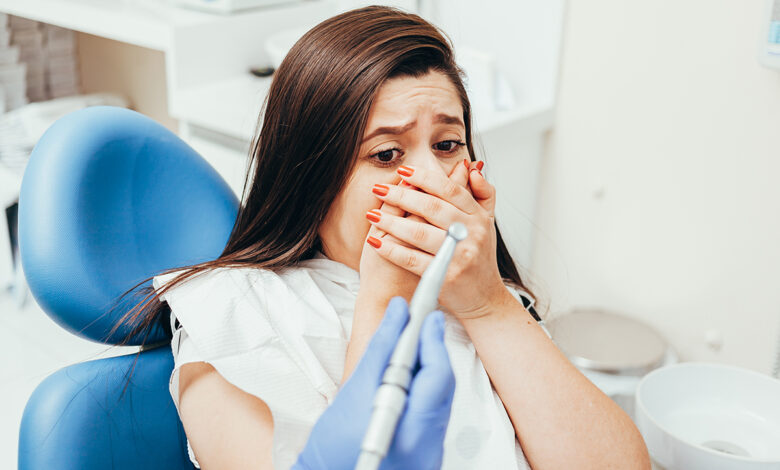Do you suffer from dental anxiety?

If you ever get nervous just thinking about going to the dentist, you’re definitely not alone. Perhaps you’ve had bad experiences in the past or you’re scared the visit might hurt. Maybe you haven’t gone in a while and are not sure what the dentist will find. You could even feel embarrassed because you let your oral care lapse.
If you ever get nervous just thinking about going to the dentist, you’re definitely not alone. Perhaps you’ve had bad experiences in the past or you’re scared the visit might hurt. Maybe you haven’t gone in a while and are not sure what the dentist will find. You could even feel embarrassed because you let your oral care lapse.
Whatever the reason is, there are ways to ease your fears and calm your anxieties. Finding a good dentist with dedicated team that is passionate about helping their patients achieve oral wellness is a great starting point. Feeling comfortable with your dental provider is the first hurdle most patient experiencing dental anxiety need to overcome.
Once you have established a good doctor/patient relationship there are other techniques patients can use to help with their future dental appointments whether it be just for a routine cleaning appointment or procedures that are a little more involved such as fillings or other restorative work.
In recent years some practices decided to incorporate conscious sedation dentistry and offer it to their patients to help take the edge off during their dental appointments. There are a series of steps that need to be taken for these types of appointments in addition to restrictions for the patient after their appointment and a driver must escort the patient to and from the appointments. Sometimes this is not always possible for patients.
There are alternatives to curbing dental anxiety that don’t involve any type of sedation or even having to ask for nitrous (laughing gas) during your next dental visit.
Deep breaths and essential oils
As mentioned above, feeling comfortable and establishing a good relationship with your dentist is the first step. You should always verbally express your concerns and fears to your dentist at your first dental visit. Anyone with anxiety knows sharing your feelings makes a world of difference. If you’re tense or anxious, do yourself a favor and get your concerns off your chest. Your dentist and dental team are better able to treat you if they know your needs.
At your next visit, distract yourself. Taking your mind off the exam may seem impossible when you’re nervous, but there are some things that that can help distract your thoughts like bringing your ear buds and listening to music or an audiobook through your cell phone. Use mindfulness techniques like relaxation. Try deep breathing exercises to help relax tension in your muscles. Practice getting in tune with your body through relaxation before your appointments so you can easily use relaxation during your appointments.
Some may think that the techniques mentioned above are just not enough to curb their fears and anxiety. There are other methods that can be incorporated with the techniques or distraction and relaxation. One of the most common forms of this are essential oils. There are a variety of essential oils blends on the market now from very reputable companies and manufacturers that work almost as well as taking an oral medication but without the lingering side effects or without any restrictions. These oils are inhaled or applied topically and are very aromatically pleasing.
Lavender, bergamot oil or ylang-ylang therapeutic grade oils are just some examples of essential oils that may help reduce your anxiety. Cypress, basil, jasmine, chamomile, juniper, rose, neroli, marjoram, geranium and clary sage aromas are also of benefit to reduce patients’ anxiety. Certain herbal treatments such as chamomile, passion flower and valerian may also have the same effect. Of course, it is always important to research oils and blends before implementing any into your routine as some people can and do have sensitivities to them.
Lastly, homeopathic treatments are a great alternative to prescription anti-anxiety medications. There are several types of homeopathic remedies available today. Each contains different ingredients to relieve dental anxiety, nervousness, panic attacks, hypertension and other emotional and mental disorders associated with dental fear. You will need to discuss your symptoms with a homeopathic expert (homeopath) or homeopathic dentist to find the right remedy for you.
By combining the above-mentioned techniques and methods and incorporating them into your dental visits may leave you surprised, and relieved, at how effective they are. Going to the dentist will seem like a walk in the park. n
Nicole Dean is the Office Manager for Dr. William J. Twohig DDS. Nicole has been working in the dental field for 14 years now, many of which were spent as a chairside assistant. She is certified in CPT and has also trained in cross coding for medical/dental billing,medical law and ethics, healthcare customer service, and health in the human body and disease.
“There are a variety of essential oils blends on the market now from very reputable companies and manufacturers that work almost as well as taking an oral medication but without the lingering side effects or without any restrictions.”




